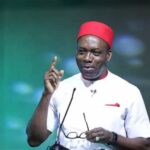Amina Nasiru lost her hearing at the age of seven. As a young deaf woman, Amina is using her skills to mentor younger girls with disability to pursue their passion. Amina, who is currently the women leader, Kaduna State Association of the Deaf, speaks on how she has weathered the storm to change the narrative of women with disabilities.
What has been your most significant challenge as a hearing-impaired individual?
My most significant challenge as a hearing-impaired individual comes with a lot of traumas, you know it’s like losing something that belongs to you dearly. Becoming deaf at a very young age (pre-lingual hearing loss) was a life altering experience that left me grappling with feelings of sadness and loss such as emotional struggle, stigma, and stereotypes, the feeling of being left out, social isolation to mention but a few. However, practising gratitude and acknowledgement keeps me going with self-acceptance. I am able to overcome those challenges with the support of loved ones right from family, friends and the resilience of the deaf community.
How has your hearing impairment affected your education or career choices?
I became deaf during primary school. Unfortunately, due to the lack of inclusive policies in most schools, I was forced to drop out. Additionally, accessing education as a child with disabilities, especially from an average family in a country without inclusive infrastructure, poses significant challenges. I personally experienced these struggles, hindering my ability to further my education. There was a dream I aspired to pursue, but as time passed and due to my deafness, I realised that discrimination had discouraged many of us in terms of employability and career choices.
What are some common misconceptions about hearing impairment that you’d like to dispel?
There are many negative perceptions about hearing-impaired individuals. People often assume that being deaf means you are illiterate, you are unable to achieve or contribute, you can only survive by begging.
However, these misconceptions are far from reality. We possess high potential that often goes unnoticed. Our impairment does not define who we are that is why I always seek to dispel and correct the misconceptions about us. We are like everyone else, capable and talented individuals deserving of respect and equal opportunities.
- I want to help students conquer fear of Mathematics – Esomnofu
- ‘National security not solely based on military’s strength’
How do you navigate public spaces or social situations where communication can be difficult?
I rarely encounter communication difficulties in public spaces or social situations, but one challenging scenario arises when attending gatherings like events, conferences, or meetings without Sign Language Interpreters. In such cases, communication becomes significantly more difficult. You see, inclusion is the key to unlocking full participation and accessibility isn’t a convenience but a right.
What role has technology played in improving your communication and daily life?
We live in the digital age (Web 3), where technology permeates every aspect of our lives. Social media platforms like Facebook, WhatsApp, Instagram, YouTube, and TikTok have revolutionised communication. They have positively impacted my daily life, enhanced my connectivity and relationships, given me access to diverse perspectives and information and improved self-expression and community engagement. While acknowledging potential negative effects, I am grateful for social media’s role in shaping my worldview and broadening my understanding of life.
Are you mentoring girls to also use these tools to enhance their potential?
Yes, because of the little exposure I have gained, I never pass on counseling girls and young women facing one form of disability or the other not to cage themselves up feeling sorry for themselves, rather, they should come out, network and mingle as that is the only way they can get past their disability and attain inclusion.
How has your hearing impairment shaped your identity or perspective on life?
I wear my deafness as a badge of pride, like an ID card around my neck. It’s a part of my identity, not a limitation. My focus for society is on demonstrating ability and creating awareness, showcasing that deafness is not a disability.
What advice or support would you offer to others who are struggling with hearing impairment?
Having struggled with hearing challenges and communication gaps after becoming deaf, I learned that self-acceptance is pivotal. Self-love and accepting yourself unlocks a lot of possibilities. Joining communities and actively participating in interactions and engagements significantly improves communication. Embrace your uniqueness, seek support, and connect with others who share similar experiences.
Can you share a triumphant moment or achievement where your hearing impairment didn’t hold you back?
Education is the greatest gift and privilege one can give to a chil; all thanks to my parents who sent me to school. Through education, I found a community (Deaf community) and participated in numerous projects, workshops, seminars, and panels, for both local and international organisations like SightSavers International and USAID. I always apply what I learned to achieve many milestones. My triumphant moments came when I delivered exceptional results, receiving accolades and standing ovations. Alhamdulillah.

 Join Daily Trust WhatsApp Community For Quick Access To News and Happenings Around You.
Join Daily Trust WhatsApp Community For Quick Access To News and Happenings Around You.
